The writing is on the wall in Derry for those who killed Lyra McKee
‘Not In Our Name’ is the message being sent loud and clear, as reports from a city that has rejected dissident republicanism

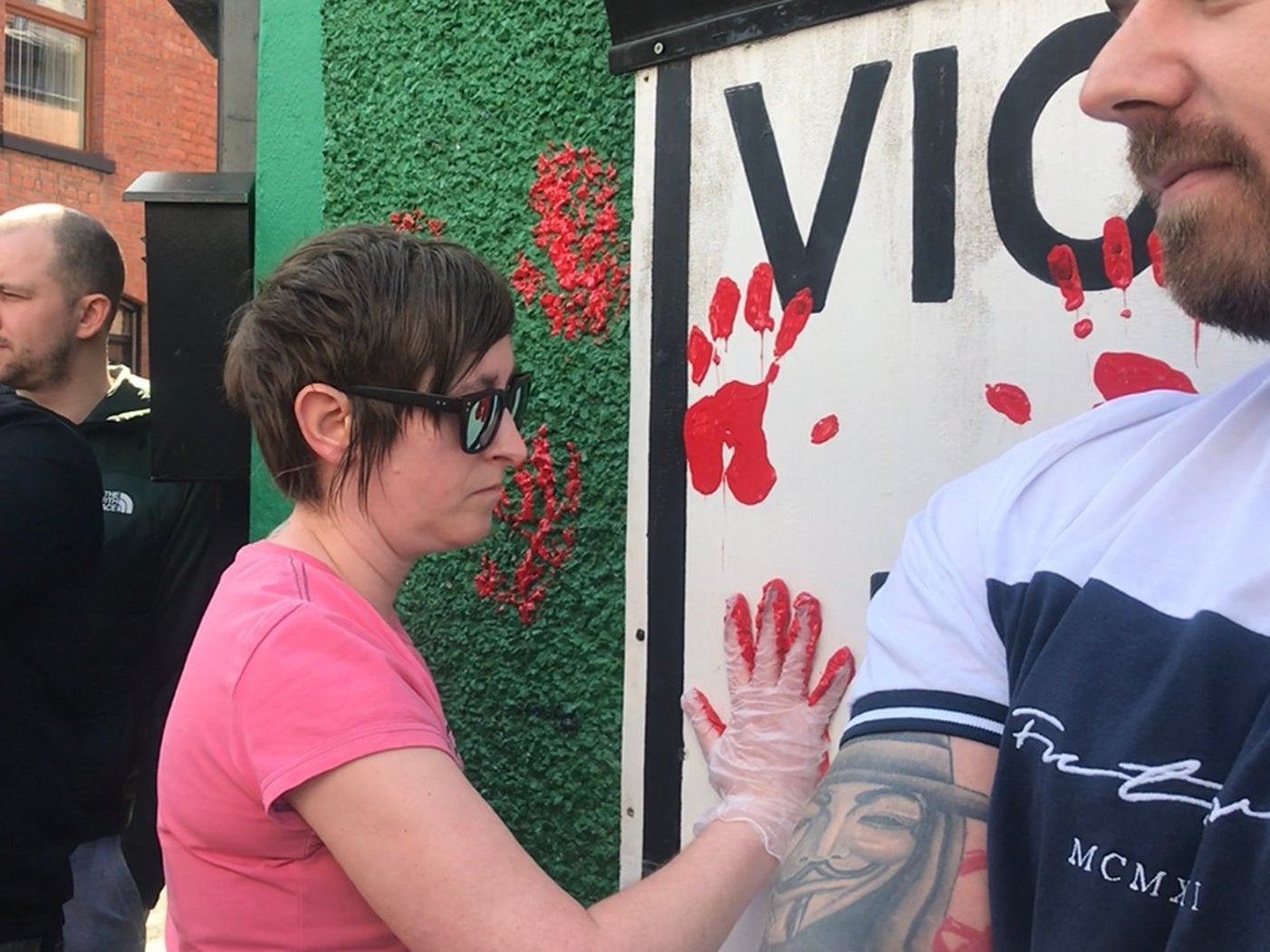
As the city of Derry tries to come to terms with last week’s murder of 29-year-old journalist Lyra McKee by dissident republicans, a new reality appears to be emerging on the walls of the city.
Daubing red handprints on the headquarters of Saoradh (see-roo), a far-left republican group accused of ties to the New IRA, the message from Lyra’s friends was clear: these people have blood on their hands.
With red paint running down the green walls of the door of Junior McDaid House, an office in the heart of Derry’s Bogside which houses Saoradh, among other groups, her friends walked up to the building and carried out their peaceful protest in front of a small group of men standing sternly with their arms folded outside the offices.
One of the women, Sinead Quinn, spoke to the gathered media. “Nothing matters,” she said, through tears. “Take me to court, take me to jail. We are strong women. We’re not afraid.”
In the heat of one of the sunniest days of the year, the women’s determination was steely. Footage captured expletives directed at the men, before a voice said loudly: “Nobody wants youse. Nobody.”
This refrain has since been reproduced across social media, with many Facebook and Twitter users replacing their profile picture with a bloodied, red palm in solidarity.
And in a city where symbols often define the urban landscape, presenting the political and social opinions of residents, it is not just the bloodied handprints that have emerged since Lyra’s killing.
The area around the Creggan shops is where some support for dissident republicans is visible through images and slogans hoisted on lampposts, or even hung from houses.
One long gable wall which bears a defiant pro-IRA statement was targeted on Friday night. Where it once read “IRA Undefeated Army, Unfinished Revolution”, it had been altered to read “IRA are done ... Defeated Army, Finished Revolution”.

Standing at Free Derry Corner on Saturday afternoon, I witnessed tourists taking photos as usual. The wall is a testament to Derry’s historic fight for civil rights, but it also serves as a contemporary canvas for ongoing political and social struggles. On any given day it could be used to promote marriage equality, or highlight the Palestinian cause.
By midnight on Saturday, someone had painted a statement on the wall that could easily have been voiced by the city itself: “Not In Our Name. RIP Lyra”.
* * *
Dissident republicans are a small group of Irish nationalists who remain committed to using physical force as a means of ending British rule in Ireland. They class the mainstream republican party Sinn Fein as sell-outs and traitors for turning away from conflict, accepting the Good Friday Agreement and engaging with the peace process.
On Thursday night, these dissidents came into direct conflict with the PSNI in the Creggan area. Officers came under attack from fireworks and petrol bombs before the shots were fired.
With many young people standing around filming events on their phones, this was sectarian conflict for the Snapchat era. Widely circulated footage shows masked figures who are probably only teenagers themselves, born after The Troubles ended in 1998.
In a statement, a group calling itself the New IRA – who were also linked to a car bomb outside Derry court house in January, and who claimed responsibility for the parcel bombs sent to London and Glasgow in March – said that they were responsible for the death, but claim Lyra was killed accidentally while their “volunteers” were “engaging the enemy”.

The bullet fired indiscriminately into a residential street could have killed anyone in its path, but there is a cruel irony that it took Lyra – a young woman whose professional work and personal ethos were centred around achieving reconciliation and equality in Northern Ireland.
Like me, she is of the generation who were given the hard-won Good Friday Agreement as a way forward. But on Thursday night, this young powerhouse, so full of boundless potential, was stopped in her tracks.
I had been aware of Lyra and her work for years through Twitter, but we only met for the first time this February at an event in London, with Booker Prize-winning Northern Irish author Anna Burns. She was friendly and familiar. Even the most fleeting encounter demonstrated the personality with which so many had clearly fallen in love.
“We will not let her death be in vain,” her friend Drea McCrory told me. “We will now pick up her activism torch and spread her word worldwide.”
* * *
The sun was shining when I arrived in Derry on Friday morning, but a dark cloud was hanging over the city. The brutal and senseless overnight murder of Lyra has left people shocked, angry and heartbroken.
Over the Easter weekend, the outrage was palpable. I came home to attend a family birthday party, but as guests arrived on Friday, all anyone could talk about was Lyra, and their disgust that she had lost her life on our streets.
Later that afternoon, among the aisles of shoppers at Sainsbury’s, people who had paused to chat over their trolleys were only talking about one thing. “Absolutely sickening,” said one woman to another, “God love her.” The words used to describe those behind the killing are largely unprintable.
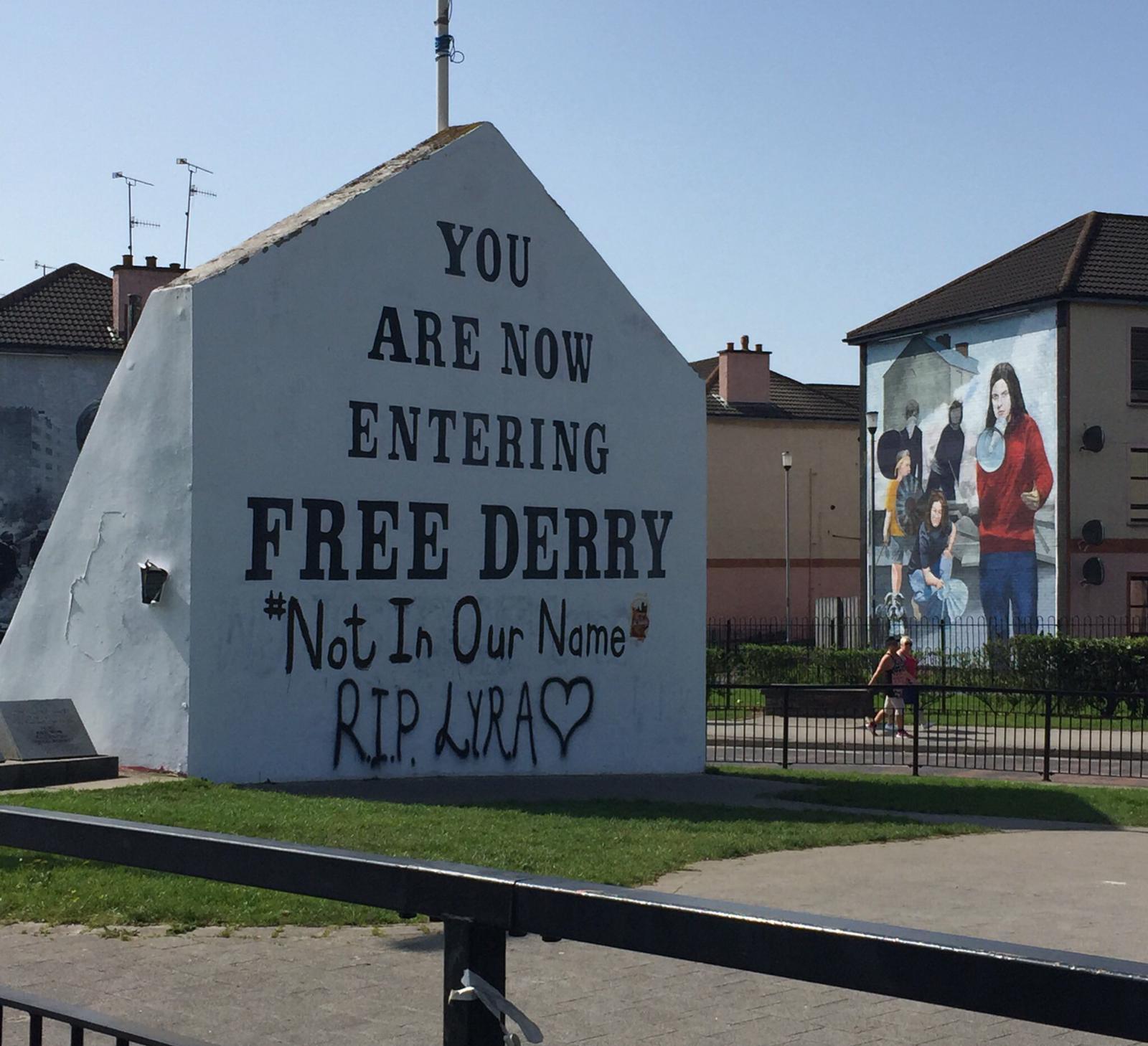
Documentary maker Alison Millar knew Lyra for over 10 years, and said friends and family feel robbed of a girl who was such a force for good.
“She had so many causes that she supported,” she told me. “If someone came to her with a problem, she would have written about it, or found them the help they needed. She really was the kind of person who would give you the last pound in her purse.
“She tried to give a voice to people who didn’t have a voice, that’s the thing that is so deeply upsetting about the whole thing.”
While they have shown the capacity to kill, dissident republicans are roundly rejected in Derry. They enjoy minimal support, and scenes like those carried out on Thursday night are seen as an embarrassment to Derry’s increasingly positive international profile. “Not In My Name” became the rallying cry across social media.
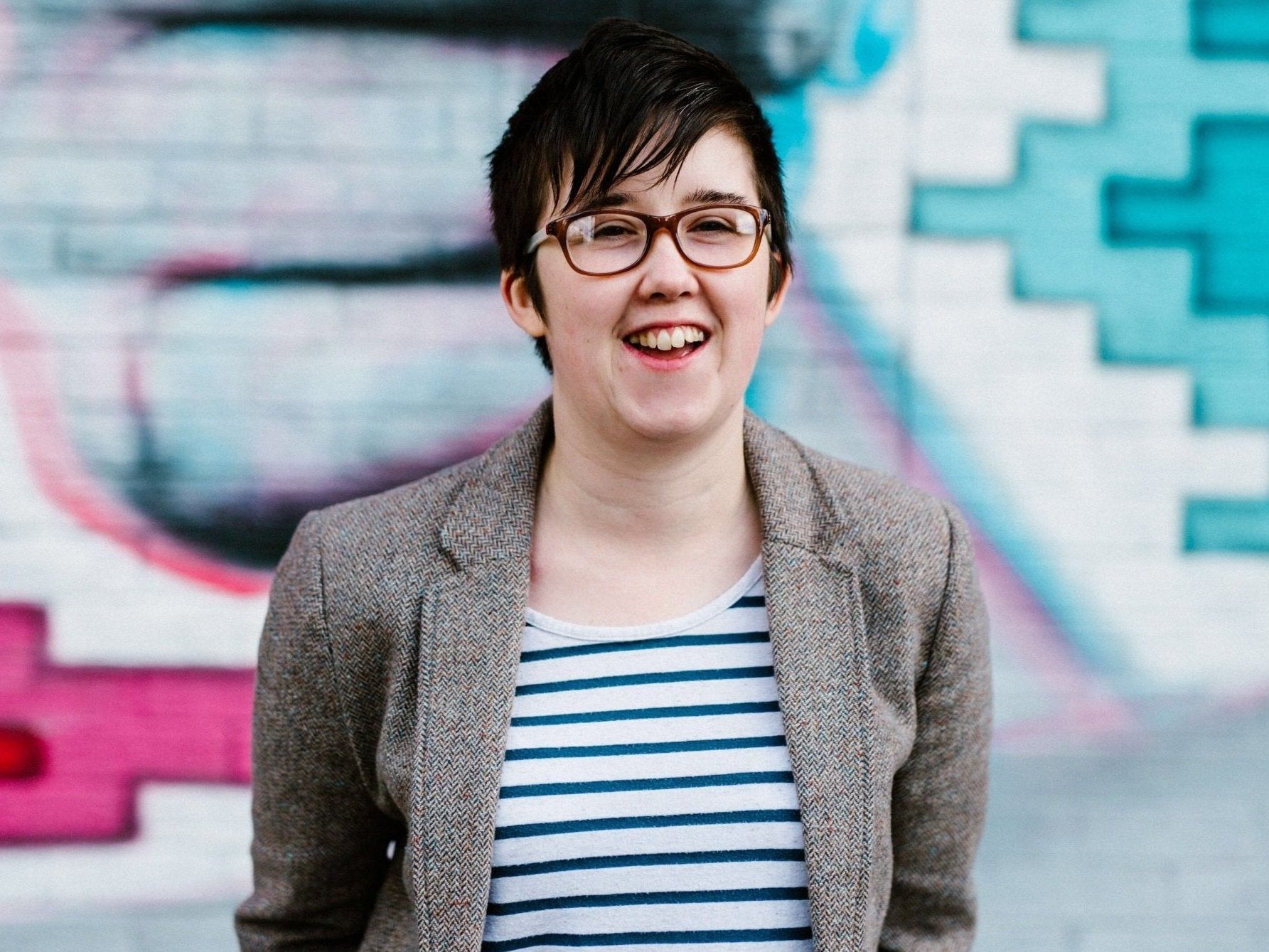
For the people of Derry, the Good Friday Agreement is not just a treaty, it is a living institution, which the people of Northern Ireland strive to realise every single day. Dissident violence goes against everything people here are working for.
Local resident Danielle Doherty lives just streets away from where Lyra was shot on Thursday night.
“These people have no support from the local community,” she told me. “We don’t want murder or violence on our streets, and it does a disservice to the people that live and work here.”
Friday evening saw a gathering of hundreds at the Guildhall Square, the historic heart of the city, and brought the extraordinary sight of DUP leader Arlene Foster at a vigil on the streets of Creggan. She doesn’t share the politics of most people in this largely republican area, but she was applauded as she pointed out their common opposition to a violent minority.
“Your pain is my pain,” said Foster. “It doesn’t matter whether you’re a Catholic or a Protestant, whether you identify as Irish or British. When people come out with guns to shoot people from their own community, then we have to say enough is enough.”
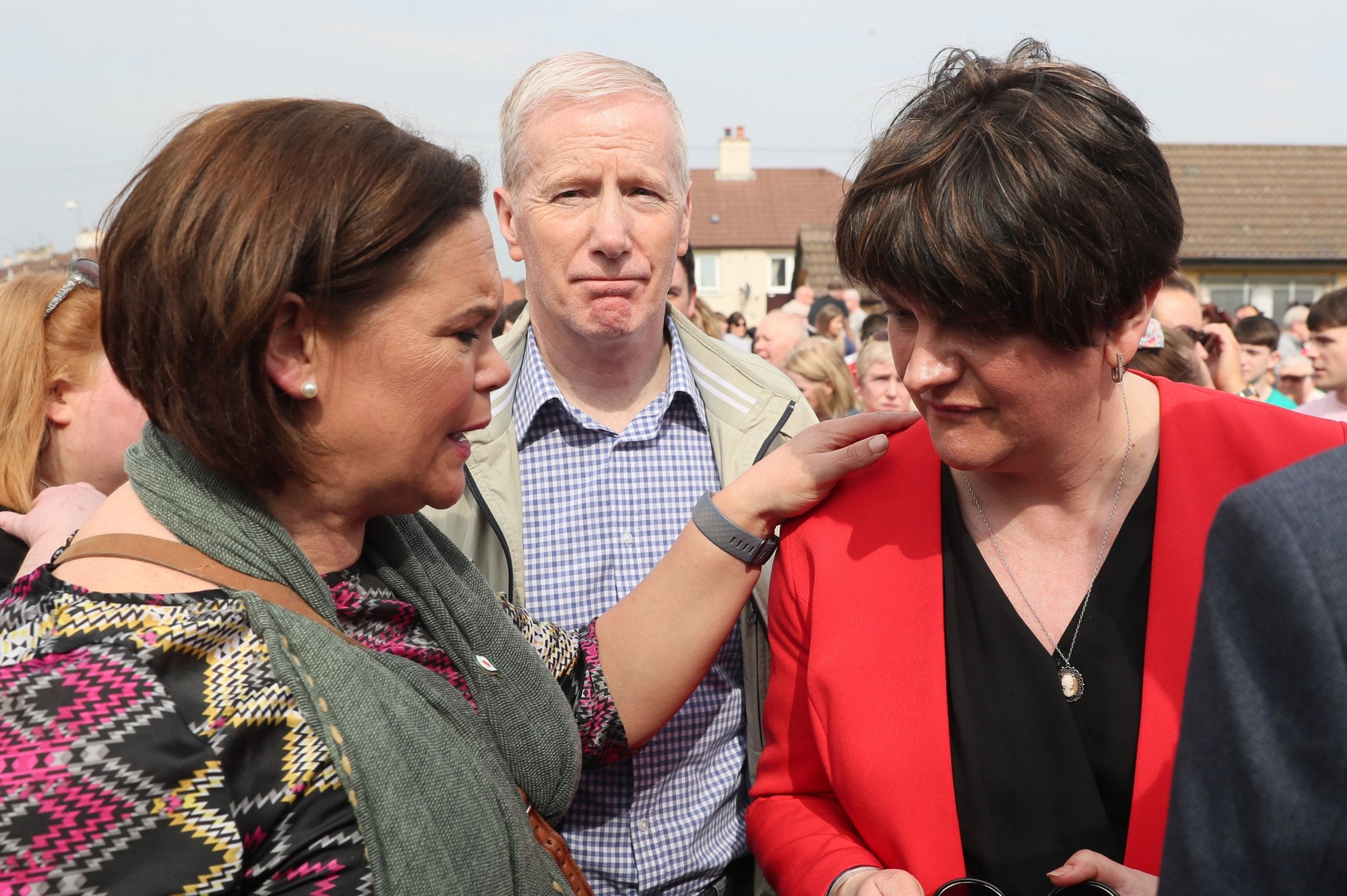
The sight of Foster standing alongside Sinn Fein leader Mary Lou McDonald, as well as the leaders of SDLP and Alliance, was also, sadly, a rarity. Northern Ireland has been without a functioning government for over two years, owing to the failure of the DUP and Sinn Fein to negotiate.
Standing shoulder to shoulder, these leaders called for “cool heads”, but by neglecting the institutions of the peace process in this way, Foster and McDonald have demonstrated a failure of politics, which strengthens the argument of those who would reject political power-sharing altogether.
This rare display of unity and strength served as a timely reminder that the respective electorates of these leaders have more in common than our narrow politics sometimes dares to imagine.
By contrast, a dissident republican Easter commemoration which had been due to take place in the area on Monday was cancelled. A statement was released by Saoradh claiming this was being done “as a mark of respect for the tragic and accidental killing of Lyra McKee”.

Their claim of sympathy was met with disgust across social media by local residents, as they are openly accused of having links to those involved in the New IRA – something which Saoradh strongly denies.
In Dublin, a similar event organised by Saoradh went ahead on Saturday, with Gardai monitoring some 400 participants. Wearing fatigues, berets and dark sunglasses, holding various republican flags, they marched in formation through the heart of O’Connell Street, with locals and tourists looking on.
Many across social media voiced anger that a uniformed militia-style group would be allowed to hold such a demonstration in the capital in the first place, not least because of what had just happened in Derry.
Senator Neale Richmond said they were “not even thugs, just clowns”. Widely circulated footage showed a journalist from the Irish Daily Mail being berated and intimidated after attempting to ask the group a question.
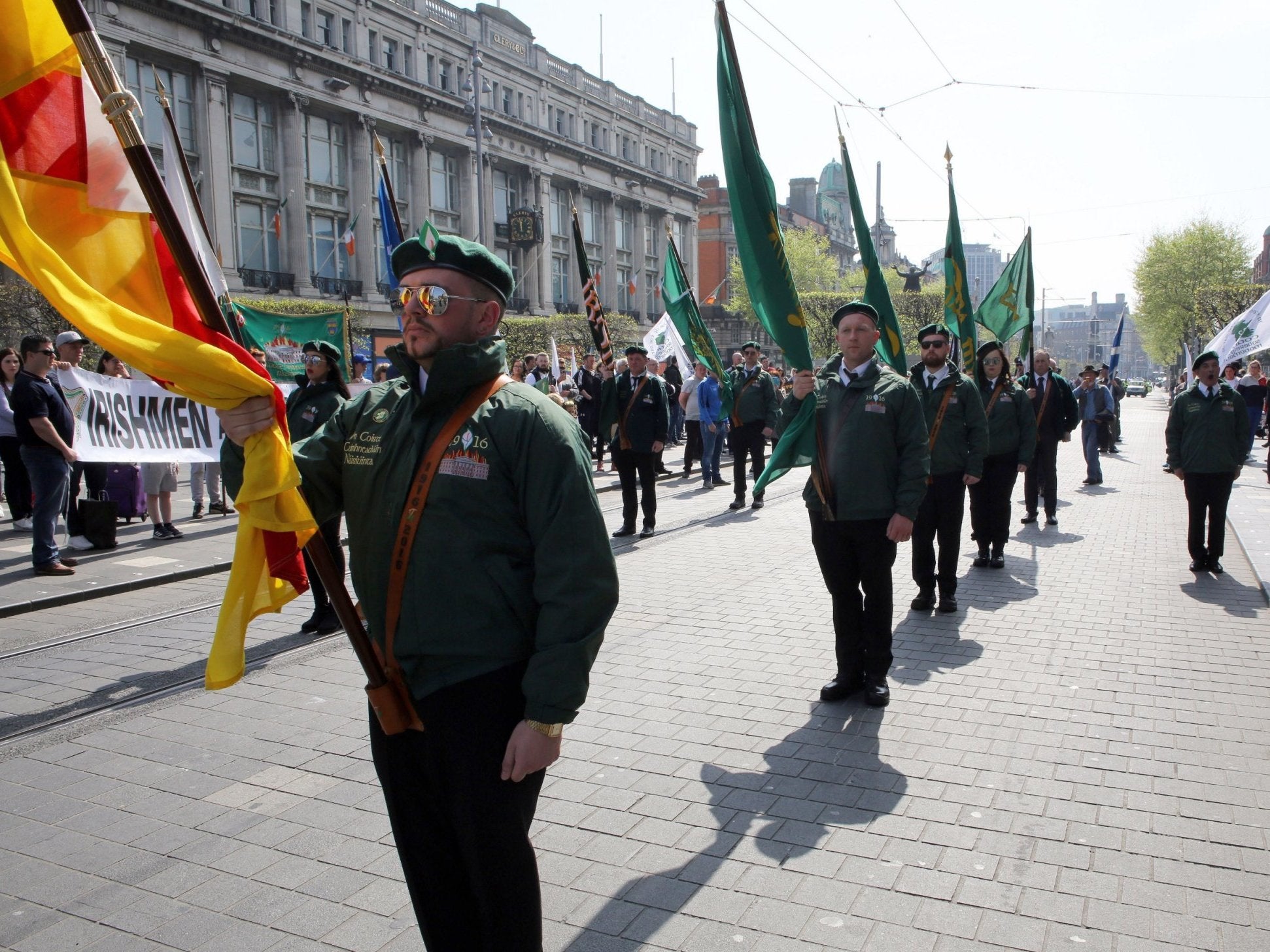
Taoiseach Leo Varadkar said Saoradh’s march in Dublin was “beneath contempt”, in the context of both Lyra McKee’s murder, and the occasion of the Easter Rising. In a tweet he wrote: “The right to assembly and march was won by the men and women of 1916 who fought for freedom and the democracy we have today. This weekend they dishonoured their legacy and memory. It was an insult to the Irish people.”
Saoradh later called on the New IRA to apologise for the murder, which they have now done, but the group’s ideology – which would see a united Ireland pursued at any cost – has been firmly dismissed this weekend by the people of Derry.
Here, people will not stand to see lives lost for a political aim which is both democratically achievable, and increasingly likely.
In a blog posted five years ago, Lyra McKee wrote words which should be heeded by all those who would have Northern Ireland’s constitutional question take priority over building a better society: “I don’t want a united Ireland or a stronger Union. I just want a better life.”
That prospect of a better life has been stolen from Lyra, but the people of Derry have put the writing on the wall for those responsible: not in our name.
Join our commenting forum
Join thought-provoking conversations, follow other Independent readers and see their replies
Comments
Bookmark popover
Removed from bookmarks